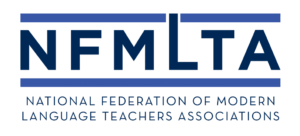2024 Dissertation Writing Support Grants
Carlo Cinaglia, Michigan State University, Investment in Studying Spanish at a U.S. University: Linguistic Identities and Discourses about Language Learning
Matt Coss, Michigan State University, Evaluating Outcomes and Fidelity in a Task-Based University Language Program
Kaidi Chen, University of Connecticut, Effects of acoustic and semantic cues on Mandarin spoken word recognition by English-speaking learners of Mandarin
Hyun-Bin Hwang, Michigan State University, The Impact Of Language Learning App Engagement on L2 Knowledge Development: A Longitudinal Study in an EFL Context
Minjin Kim, The Pennsylvania State University, Second Language Learners’ Language Development in Different Modes: Focusing on Complexity, Accuracy, and Fluency
Coral I Zayas-Colon, Temple University, Translanguaging and Language Socialization at the Uruguayan-Brazilian Border: Portraits of Identity, Language Ideologies, and Resistance
Jennifer Cox, Indiana University, Agents of standardization in Picard: Attitudes and ideologies surrounding diverse community approaches
Eunsun Lee, University of Pennsylvania, Negotiating Multilingualism in the Neoliberal Era: Migration and Language Learning Practices of East Asian Women at a Korean Language Institute in South Korea
2023 Dissertation Writing Support Grants
Eunhae Cho, The Pennsylvania State University, Ethical and psychological challenges of upward educational mobility in Korea
Marcella Caprario, Northern Arizona University, Effectiveness of English as a Lingua Franca Communication Strategies Instruction for Intercultural Communication
Sanghee Kang, Georgia State University, The role of chatbot-assisted collaboration tasks and learner characteristics in the alignment-driven learning of L2 grammar and pragmatics: Comparing provision of primes and recasts
Hitoshi Nishizawa, University of Hawaii at Manoa, Adaptation to foreign accents by second language learners
Michaela Nuesser, University of Hawaii at Manoa, A Mixed Method Approach to Phenomena associated with Linguistic Relativity and Conceptual Transfer: Drawing and Painting Events as Perceived by Bilinguals
Brittany Finch, Michigan State University, The effectiveness of L1 and L2 literacy instruction: A longitudinal eye-tracking study
Mackensie Blair, University of Delaware, Exploring the role of language-mixing on word recognition and word learning in school aged children learning a second language
2022 Dissertation Writing Support Grants
Jing Zhong, University of Hawaii, What gets transferred: Ditransitives and passivization of the double object construction in L3 Mandarin
Yulia Khoruzhaya, The Pennsylvania State University, Motion Constructions in L2 Spanish Learners’ Oral Production: A Longitudinal Study
Maria Kostromitina, Northern Arizona University, The Effect of Pragma-Prosodic Instruction and Cognitive Individual Differences on learner Production of Spoken Requests
Xiaolong Lu, The University of Arizona, The Study of Formulaic Expressions in Chinese as a Second Language: A Psycholinguistic Investigation
Víctor Garre León, University of Texas at Austin, The development of interactional competence and intersubjectivity: A sociocognitive approach to L2 Spanish interactions
Jingyuan Zhuang, The Pennsylvania State University, Promoting Second Language Development of English Modality Through Online Concept-Based Language Instruction: A Mixed Methods Study Purpose of the Study
Ryo Maie, Michigan State University, Testing and validating the three-stage model of second language skill acquisition
Masaki Eguchi, University of Oregon, Automatic analysis of stance-taking in academic writing: A systemic functional perspective
2021 Dissertation Writing Support Grants
Tricia Thrasher, University of Illinois-Urbana Champaign, Saying ‘Au Revoir’ to Anxiety in a Heartbeat: The benefits of Virtual Reality for Language Learning
Heesun Chang, Texas A&M University, Linguistic-Level Authenticity in ITA Assessment: A Corpus Analysis of Linguistic Characteristics of Prospective International Teaching Assistants
Wai Man Adrienne Lew, Columbia University, Input Robustness: A Study of ESL Textbooks
Hyejin Cho, Georgia State University, Extensive Reading-to-Write Task Outcome, Vocabulary Learning and Korean EFL Students’ Perceptions Towards Task Performance: Comparing Monomodal and Multimodal Composing Tasks
Jorge Luis Beltran Zuniga, Columbia University, Examining the role of assistance in a scenario-based test of L2 oral argumentation from a learning-oriented perspective
Jeong Mun, Georgetown University, Individual Variables and Spanish Phonological Development in L3 learners
Ye Shen, University of Delaware, What is the influence of Heritage Language on Literacy?
2020 Dissertation Writing Support Grants
Yangting Wang, The University of Texas at San Antonio, Linking Learning-Oriented Assessment and Assessment Use Argument Framework to validate the consequence of an English Placement Assessment
Ivana Rehman, Iowa State University, Computer-Assisted Pronunciation Training (CAPT)
Amy Hutchinson, Purdue University, The Effect of Foreign Film on the Production and Perception of Second Language Speech
Katherine Kerschen, The Pennsylvania State University, Semantic Feature Training as a Means to Improve Productive L2 Vocabulary Knowledge
Rachel Mamiya Hernandez, University of Hawaii, Integrated Multimedia Design for Language Learners
Huan Liu, Washington University, University-Level Second Language Readers Comprehending Informational Texts: A Mixed-methods Analysis of the Effects of Comprehension Questioning Strategies, Comprehension Subskills and Assessment Task Types
Silvana Domaz, Arizona State University, A Virtual Approach to Communication: Augmented Reality and Language Related Episodes
Wei Yi, University of Maryland, Attentional processing and incidental learning of semantically transparent and opaque compound words through reading: An eye-tracking study
Stefan Vogel, University of Maryland, Collaboration as a Path to Professionalizing Leadership: Insights from L2 Writing Teachers’ Narratives
Feng Liang, University of Cincinnati, Adult Chinese Heritage Language Learners in the United States: Investments and Identities
